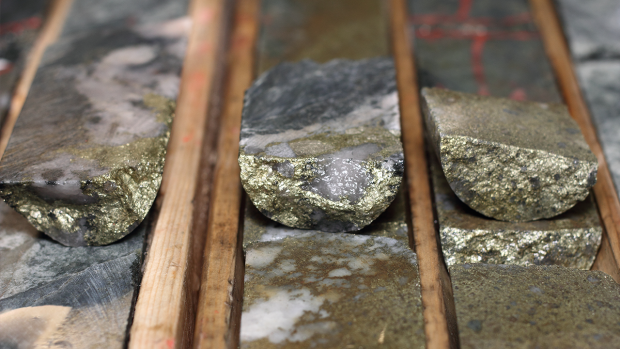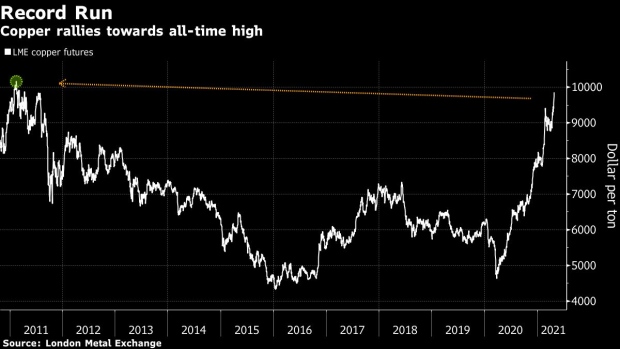Apr 27, 2021
Copper surges toward US$10,000 as bulls bet on global rebound
, Bloomberg News

Copper’s stunning rally toward all-time highs above US$10,000 is accelerating, with bulls swarming in to profit as stimulus measures, vaccine rollouts and climate pledges fuel a global recovery from the pandemic.
Copper extended gains to the highest in a decade on Tuesday as global growth underpinned a rally in metals markets ranging from aluminum to iron ore, which itself was approaching a new peak as steel prices surge. Commodities are advancing toward the highs of the last supercycle, when prices spiked in the early 2000s on a jump in Chinese orders.
Just as copper demand is set to soar once more, there are mounting concerns that producers will struggle to plug the gap as they battle technical and regulatory pressures. In top producer Chile, a group of port workers began protests against the government’s pandemic relief policies this week, threatening near-term supplies. In the longer term, producers worry that plans to boost mining royalties could stifle investment and make the country less competitive.
“While demand may have done as much as it can for the shorter-term cycle, supply bottlenecks both in raw materials and in freight continue to support,” BMO Capital Markets analysts including Colin Hamilton said in an emailed note. “Meanwhile, positive medium-term global growth dynamics continue to boost financial market interest in commodities as a whole.”
Metals led by copper, a barometer of the global economy, are benefiting as the world’s largest economies announce stimulus programs and climate pledges while rebuilding from the pandemic shock.

Copper rose as much as 2.2 per cent to US$9,965 a metric ton on the London Metal Exchange, the highest level since March 2011, before settling at US$9,855.50 at 5:51 p.m. local time. Prices hit a record US$10,190 in February 2011. Aluminum declined after earlier touching a three-year high. Steel prices are spiking from Asia to North America, while iron ore’s march toward new highs is accelerating as China’s mills keep churning out alloy.
Despite all the bullishness, near-term copper demand from China may weaken. The top user may ship more of the metal overseas amid weaker-than-expected domestic demand, with the so-called arbitrage window for exports opening up for traders for the first time since September, according to Shanghai Metals Market.
This development “may potentially deter some speculative buying in London in the very short term,” said Wenyu Yao, senior commodities strategist at ING Bank.
Fed focus
In other markets, gold was steady ahead of a two-day Federal Reserve policy meeting. The central bank has primed investors for no major changes in the bank’s language on inflation and rate expectations.
U.S. gross domestic product data released Thursday will show how the economic recovery fared in the first quarter, potentially impacting investor demand for havens. Economists surveyed by Bloomberg predict an annualized 6.8 per cent expansion, after a moderate 4.3 per cent rate in the first quarter.
Spot gold fell 0.2 per cent to US$1777.59 an ounce, after gaining 0.2 per cent on Monday. Futures for June delivery on the Comex fell 0.1 per cent to settle at US$1,778.80 an ounce. Spot silver rose while platinum edged lower.
Palladium surge
Palladium pared gains after earlier climbing toward US$3,000 an ounce amid bets on surging demand from automakers and supply issues at top miner MMC Norilsk Nickel PJSC. HSBC Holdings Plc said the metal could rise past US$3,100 an ounce due to a widening deficit, before dropping to US$2,740 by the end of the year.
“High prices will likely encourage the mobilization of largely unquantifiable above ground stocks,” analyst James Steel wrote in a note, while substitution of cheaper platinum in autocatalysts should start to clip demand.



